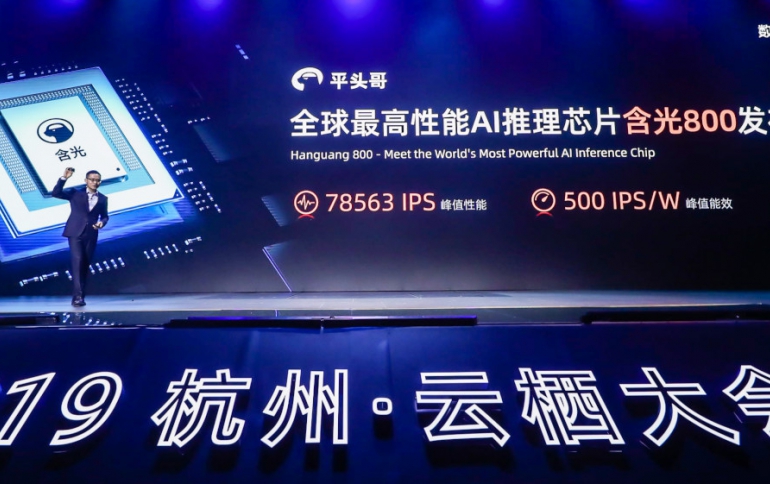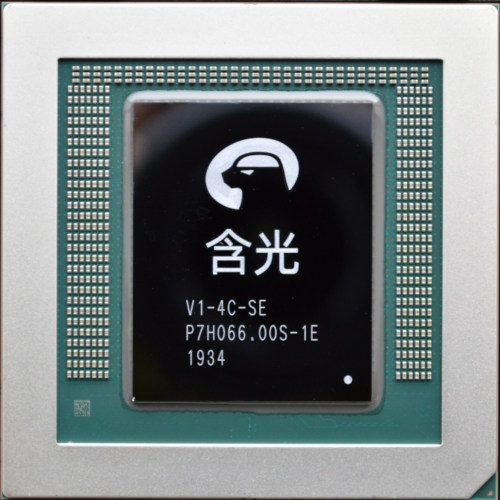
Alibaba Unveils the Hanguang 800 AI Chip for Cloud Computing Services
Alibaba Group Holdings Ltd has developed a new chip that specializes in machine-learning tasks and which will be used to enhance services for its cloud computing division.
The Hanguang 800 is the company’s first self-developed AI chip is currently being used within Alibaba to power product search, automatic translation, and personalized recommendations on the e-commerce giant’s web sites. It was developed by DAMO Academy, a research institute Alibaba launched in late 2017, and T-Head, the company’s specialized semiconductor division.
While it can take traditional GPUs an hour to run through and categorize the 1 billion new product images that are uploaded onto Taobao each day, the Hanguang 800 can complete the same task in five minutes, according to libaba Chief Technology Officer Jeff Zhang.
"The differentiator here is that algorithms are directly built into the chip. Alibaba is proving that its technological strength not only lies in software, but hardware as well," said a senior technology executive.
Alibaba said its single-chip computing performance reached a peak 78,563 IPS, while the computation efficiency was 500 IPS/W during the Resnet-50 Inference test, both of which it claimed to be "largely outpacing industry average".

The company has no immediate plans to sell the chip as a standalone commercial product.
Tech giants such as Alphabet and Facebook are also developing their own custom chips, aiming to improve the performance of specialized AI tasks at company-operated data centers.
This is not the first move in the semiconductor space for Alibaba. Last year, in April, DAMO began developing its first chip tailored to machine-learning tasks, which paved the way for the Hanguang 800. Five months later, in September, Alibaba launched a new semiconductor unit, T-Head, to create high-performance yet affordable chips, with the vision of making computing power more accessible for large and small businesses.
The chip division has since released “XuanTie 910,” a processor that reduces the costs of making chips for Internet of Things applications, such as self-driving cars, or the “Wujian” chip-making platform, which brings together everything from design software to developer tools. T-Head (literal translation: “flat-headed brother”) is a nickname for honey badgers, the division’s mascot and an animal known for its tenaciousness.
Alibaba also released its first core processor IP in July based on RISC-V open-source chip architecture. RISC-V gives firms a potential alternative to the dominant architecture of Britain’s Arm Holdings Inc.
The Chinese e-commerce titan is the biggest cloud player by market share in the mainland, and within the top five in the world. Still, the company trails market leader Amazon by a long way.
Alibaba’s move into AI chips follows Huawei which last month unveiled its own AI semiconductor called the Ascend 910, aimed at being used in data centers. Companies using AI applications require huge amounts of data to train smart algorithms, and that can take several days or weeks. Huawei claims its chip is the “world’s most powerful AI processor.”
The launch of AI chips by Alibaba and Huawei highlights the country’s ambitions to create its own homegrown semiconductor industry. Currently, Chinese companies rely heavily on American technology, but the Washington’s move to blacklist Huawei and restrict its access to American tech has increased China’s focus on chips.
Beijing highlighted semiconductors as a key area of the “Made in China 2025” plan, a government initiative that aims to boost the production of higher-value products. China aims to produce 40% of the semiconductors it uses by 2020 and 70% by 2025.





















